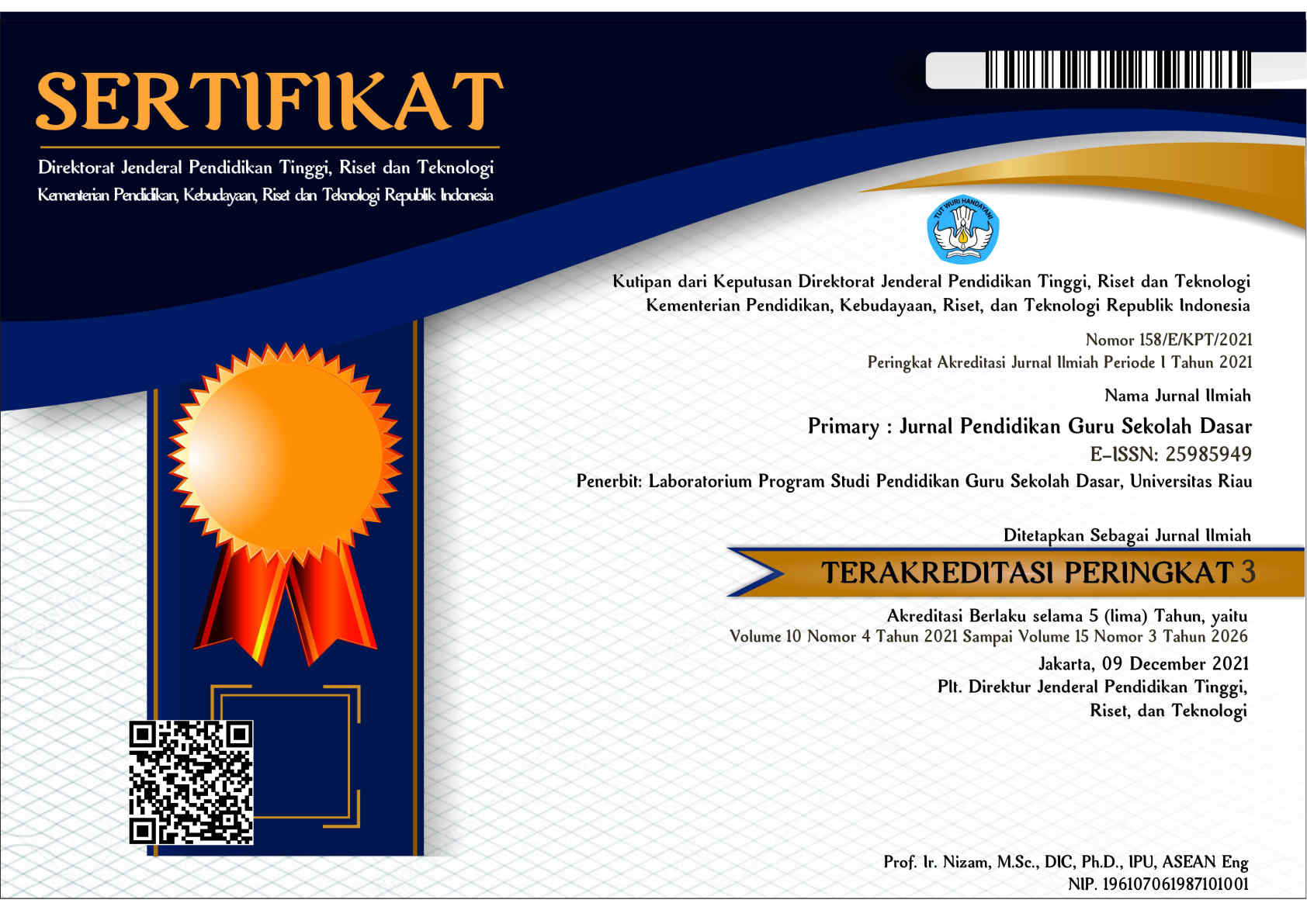PENERAPAN TEKNIK PEMBELAJARAN THINK PAIR SQUARE UNTUK MENINGKATKAN HASIL BELAJAR SISWA
Abstract
This research aimed to find out that the implementation of think pair square to improve students’ learning outcome. This was a classroom action research. The data analysis technique used in this research is qualitative and quantitative data analysis. The results showed that there was an increase in student learning outcomes from before the action, cycle I, and cycle II. Before the action only 9 students (56,25%) achieved the KKM, in cycle I increased to 11 students (68,75%) achieved the KKM, and In cycle II increased to 14 students (87.50%) achieved the KKM. Thus it can be concluded that the application of think pair square learning technique can improve students’ learning outcomes.
Keywords
Full Text:
PDF (Bahasa Indonesia)References
Anderson, H. M., Moore, D. L., Anaya, G., & Bird, E. (2005). Student learning outcomes assessment: A component of program assessment. In American Journal of Pharmaceutical Education (Vol. 69, Issue 2, pp. 256–268). https://doi.org/10.5688/aj690239
Anthony, G., & Walshaw, M. (2009). Characteristics of Effective Teaching of Mathematics: A View from the West. Journal of Mathematics Education, 2(2), 147–164.
Antika, M. S., Andriani, L., & Revita, R. (2019). Pengaruh Penerapan Model Pembelajaran Kooperatif Tipe Think-Pair-Square terhadap Kemampuan Pemahaman Konsep Matematis Ditinjau dari Kemampuan Awal Matematika Siswa SMP. JURING (Journal for Research in Mathematics Learning), 2(2), 118. https://doi.org/10.24014/juring.v2i2.7553.
Arends, R. I., & Kilcher, A. (2010). Teaching for Student Learning: Becoming an Accomplished Teacher. Routledge.
Arikunto, S., Suhardjono, & Supardi. (2008). Penelitian Tindakan Kelas. Bumi Aksara.
Asakawa, M., Kanamaru, A., Plaza, T., & Shiramizu, C. (2016). Useful expressions for Implementing Cooperative Learning in English. The Electronic Journal for English as a Second Language, 19(4).
Djamarah, S. B. (2006). Strategi Belajar Mengajar. Rineka Cipta.
Irianti, N. P. & Wijaya, E. M. S. (2018). Think-Pair-Square (TPS), Sebuah Model Pembelajaran Kooperatif dalam Meningkatkan Aktivitas dan Prestasi Belajar Siswa. Inteligensi : Jurnal Ilmu Pendidikan, 1(1), 17–22. https://doi.org/10.33366/ilg.v1i1.1139.
Irianto, S. (2020). Peningkatan Sikap Percaya Diri dan Prestasi Belajar Matematika Melalui Model Pembelajaran Kooperatif Tipe Think Pair Square. Jurnal JSSH, 4(1). http://jurnalnasional.ump.ac.id/index.php/JSSH/article/view/5715
Isjoni. (2011). Cooperative Learning Mengembangkan Kemampuan Belajar Berkelompok. Alfabeta.
Kemendikbud. (2013). Kerangka Dasar dan Struktur Kurikulum 2013. Kemendikbud.
Lasiyanto. (2018). Penerapan teknik penugasan dengan metode think pair square untuk meningkatkan minat dan prestasi belajar matematika siswa dalam pembelajaran matematika. Jurnal Wiyata Dharma: Jurnal Penelitian Dan Evaluasi Pendidikan, 6(1), 15–19.
Lie, A. (2007). Cooperative Learning. PT. Grasindo.
Mulyani, E. A., Kasdianti, A., Ain, S. Q., Alim, J. A., Sari, I. K., & Alpusari, M. (2020). Correlation between Elementary School Students’ Mathematics Self-Efficacy and Motivation. Journal Of Teaching and Learning in Elementary Education (JTLEE), 3(1). https://doi.org/10.33578/jtlee.v3i1.7831
Purwanto. (2009). Evaluasi Hasil Belajar. Pustaka Pelajar.
Sanjaya, W. (2010). Strategi Pembelajararan Berorientasi Standar Proses Pendidikan. Kencana.
Slavin, R. E. (2006). Educational Psychology: Theory and Practice (8th ed.). Pearson Education, Inc.
Sudjana, N. (2009). Penilaian Hasil Proses Belajar Mengajar. PT Remaja Rosdakarya.
DOI: http://dx.doi.org/10.33578/jpfkip.v10i3.8266
Refbacks
Copyright (c) 2021 Intan Kartika Sari, Ardi Yulis, Awalina Barokah, Eva Astuti Mulyani

This work is licensed under a Creative Commons Attribution-NonCommercial-ShareAlike 4.0 International License.
____________________________________________________________
Primary: Jurnal Pendidikan Guru Sekolah Dasar
Secretariat
Program Studi Pendidikan Guru Sekolah Dasar
Gedung B1, FKIP Universitas Riau
Kampus Bina Widya Km. 12,5 Simpang Baru Panam
Pekanbaru Riau Indonesia 28293
e-mail : primary@ejournal.unri.ac.id



